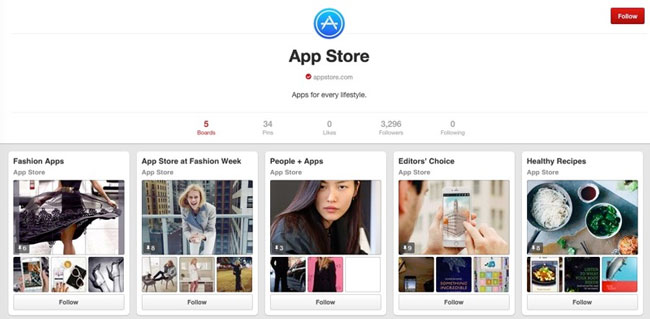|

Didn’t see this coming but a most interesting move for both companies: Apple teams up with Pinterest to help make app discovery even easier.
In thinking about the endgame for every business having an app, the problem of how to get users to download and use hundreds of apps seems severe. In fact even finding the apps is a problem. Perhaps this could help.
We continue to see that the applications for visual search are vast and growing.
I’ve been thinking about mobile apps a lot lately … (as you might expect!) The IOS and Android app ecosystems are thriving and perhaps one might think nothing need be done to make them healthier, but in fact, there is a lot that can be done.
First, there is the problem of finding interesting apps, isolating the signal from the noise. No app store has solved this effectively. Second, there is the problem of installing apps; in theory a single link can do the trick, but in practice the process is more complicated, involving authentication and many clicks and time. People are loathe to pay for apps without trying them first, and there is no way to have trial periods without complicated fremium models or implementing in-app upgrades. Perhaps more significantly, there is significant effort requires to create apps, far beyond (and different from) the effort required to create websites. And finally there is competition for apps on a phone; too many apps take up too much space, and clutter one’s phone desktop. Honestly the desktop itself is a problem; except for the home page, who searchers for apps by visually scanning their desktop anymore?
I predict this whole mechanism will evolve. Finding apps will be as easy and varied as finding websites, with many search engines and referral processes and review media. A single link will do the trick for trying an app, and it will not require authentication or [too much] time, and it will be easily reversible. The business models will evolve to make upgrading to a paid version easy. (Most apps are free anyway, just like most websites!) There will be cloud-based caches for apps, so that competition for phone resources will not be a problem. (Similar to the way iCloud and Dropbox have made “infinite” libraries of music and videos possible.) And finally the desktop will be replaced with something better and easier. We no longer have an icon on our computer for each website we visit, and we will not have an icon for each app we’ve tried either. The home page will be a most-recently used cache.
Oh one more crucial thing … mobile apps will evolve a mechanism for deep linking, so that they can link to each other, and link to each other’s content. This capability is the single main thing that made the web what it is today (indeed, it is the reason the web is so-named), and the lack of it is the most restrictive thing about the mobile app world.
Perhaps the best way to kill several of these birds with one stone is to park each mobile app at a unique URL in webspace. You can link to the app simply by … linking to the app, and if you follow the link then the app is loaded. A well defined way will be created to serve up an IOS or Android or Windows version, as appropriate. URLs which are subordinate to the app can be used for deep linking.
And of course, visual search will be integrated into the discovery process, to make finding apps even easier.
| 



